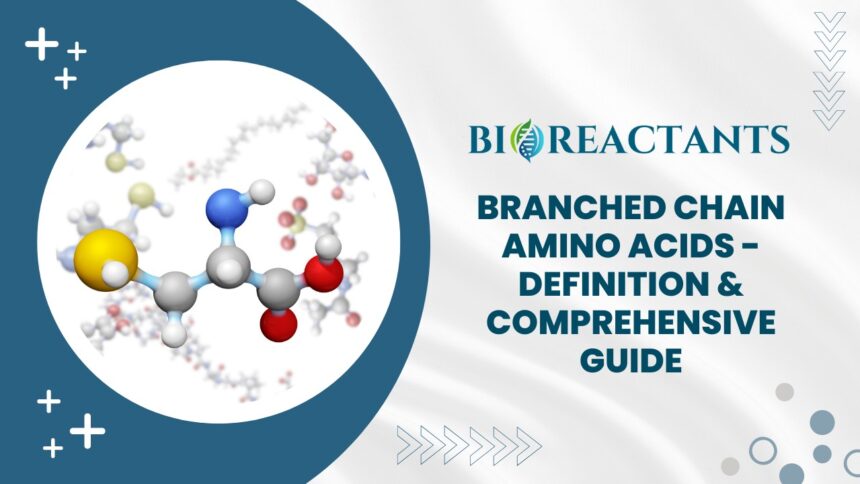Are you looking to boost your fitness game and optimize muscle growth? If so, you’ve probably heard about Branched Chain Amino Acids (BCAAs). These powerful supplements have taken the health and fitness world by storm, promising to enhance performance, aid recovery, and support overall well-being. But what exactly are BCAAs, and how can they benefit your body? In this blog post, we will dive deep into everything you need to know about BCAAs – from their functions in the body to their impact on muscle soreness and athletic performance. Get ready to take your workouts to the next level with the ultimate guide on Branched Chain Amino Acids!
What are Branched Chain Amino Acids (BCAAs)?
Branched Chain Amino Acids (BCAAs) are a group of essential amino acids that play a crucial role in protein synthesis and muscle growth. The three main BCAAs are leucine, isoleucine, and valine, which cannot be produced by the body and must be obtained through diet or supplementation.
These amino acids are called “branched-chain” due to their molecular structure, which includes a branched side chain. Leucine is particularly important for stimulating muscle protein synthesis, while isoleucine helps regulate energy levels during exercise. Valine contributes to muscle metabolism and tissue repair.
BCAAs have gained popularity among athletes and fitness enthusiasts for their ability to support muscle recovery, reduce fatigue during workouts, and promote overall physical performance. Whether you’re an avid gym-goer or just looking to improve your health, understanding the benefits of BCAAs can help you reach your fitness goals more effectively.
What are the primary functions of BCAAs in the body?
Branched Chain Amino Acids, or BCAAs, play a crucial role in the body’s protein synthesis process. Leucine, isoleucine, and valine are the three essential amino acids that make up BCAAs. These amino acids cannot be produced by the body itself and must be obtained through diet or supplementation.
BCAAs are primarily known for their ability to promote muscle growth and repair. They help reduce muscle breakdown during exercise, making them popular among athletes and fitness enthusiasts looking to enhance their performance. Additionally, BCAAs can also aid in reducing fatigue during prolonged physical activity.
Apart from their impact on muscles, BCAAs also contribute to energy production and regulate blood sugar levels. This makes them beneficial not only for individuals seeking muscle gains but also for those looking to improve overall physical endurance and recovery post-workout.
Incorporating foods rich in BCAAs into your diet or adding a supplement can provide you with these essential nutrients necessary for optimal health and fitness goals.
What are the main sources of BCAAs in the diet?
When it comes to incorporating Branched Chain Amino Acids (BCAAs) into your diet, there are several natural sources you can turn to. One of the primary sources of BCAAs is animal-based protein like meat, fish, and eggs. These foods are rich in leucine, isoleucine, and valine – the key components of BCAAs.
For vegetarians and vegans, plant-based sources such as tofu, tempeh, quinoa, and legumes also contain varying levels of BCAAs. Additionally, dairy products like milk, yogurt, and cheese are good options for those looking to boost their BCAA intake.
If you prefer a convenient option on-the-go or need an extra dose of BCAAs during your workouts, supplements like powders or capsules are readily available in the market. However, always remember that whole food sources should be your primary focus when aiming to increase your BCAA consumption naturally.
How do BCAAs benefit muscle growth and recovery?
Branched Chain Amino Acids (BCAAs) play a crucial role in muscle growth and recovery for individuals who are looking to improve their fitness performance. These essential amino acids, including leucine, isoleucine, and valine, are not produced by the body naturally; thus, they must be obtained through diet or supplementation.
BCAAs have been shown to promote protein synthesis in muscles, which is essential for muscle repair and growth after workouts. By stimulating muscle protein synthesis, BCAAs help to enhance the results of resistance training and reduce muscle breakdown during intense exercise sessions.
Moreover, BCAAs can also aid in reducing muscle soreness post-workout. This means that incorporating BCAA supplements into your routine may help you recover faster from strenuous physical activity and get back to training sooner.
Incorporating BCAAs into your regimen can provide added support for those looking to maximize their efforts in building lean muscle mass while minimizing recovery time between workouts.
Can BCAAs help with weight loss or fat burning?
Many people wonder if BCAAs can aid in weight loss or fat burning. While BCAAs themselves do not directly burn fat, they can play a role in supporting these goals when combined with a healthy diet and exercise routine. By helping to preserve lean muscle mass during calorie restriction, BCAAs can assist in maintaining metabolic rate and promoting fat loss.
In addition, BCAAs have been shown to potentially reduce feelings of fatigue during workouts, allowing for more intense and longer training sessions that can contribute to weight loss efforts. Some studies suggest that taking BCAA supplements before cardio exercise may enhance the body’s ability to use fat as fuel.
However, it’s essential to remember that BCAAs are not a magic solution for weight loss on their own. Consistency in nutrition and training is key to achieving sustainable results over time.
Are there any side effects associated with taking BCAA supplements?
When it comes to BCAA supplements, there are some considerations regarding potential side effects. Some individuals may experience digestive issues such as bloating, nausea, or stomach discomfort when taking BCAAs in high doses. It’s essential to start with a low dosage and gradually increase to assess your body’s tolerance.
In rare cases, allergic reactions can occur in response to BCAA supplements, so if you have any known allergies or sensitivities, consult with a healthcare provider before starting supplementation. Additionally, some people may notice changes in blood sugar levels when consuming BCAAs, particularly those with diabetes or insulin resistance.
To minimize the risk of side effects, it’s crucial to follow the recommended dosage guidelines provided by reputable sources and listen to your body’s signals. Always prioritize whole food sources of amino acids whenever possible and consider consulting a healthcare professional before incorporating new supplements into your routine.
When is the best time to take BCAA supplements?
Timing is crucial when it comes to taking BCAA supplements for maximum effectiveness. Many athletes and fitness enthusiasts prefer consuming BCAAs before or during their workouts to fuel their muscles and prevent muscle breakdown. By providing your body with a readily available source of amino acids, BCAAs can help support energy levels and endurance during exercise.
Others opt to take BCAAs post-workout to aid in muscle recovery and repair. This can be especially beneficial after intense training sessions when the muscles need extra support to bounce back stronger. Some even choose to sip on BCAAs throughout the day to maintain a steady supply of amino acids for optimal muscle preservation.
The best time to take BCAA supplements may vary depending on individual preferences and fitness goals. Experimenting with different timings can help you determine what works best for your body and workout routine.
How do BCAAs compare to other amino acids or protein supplements?
When it comes to comparing Branched Chain Amino Acids (BCAAs) with other amino acids or protein supplements, it’s essential to understand their unique roles. BCAAs consist of three essential amino acids – leucine, isoleucine, and valine – which play a crucial role in muscle growth and recovery. Unlike other amino acids that are metabolized in the liver, BCAAs are predominantly metabolized in skeletal muscle.
Protein supplements often contain a variety of amino acids, while BCAA supplements specifically target muscle protein synthesis. This makes them particularly beneficial for individuals looking to enhance athletic performance and support muscle recovery after intense workouts. On the other hand, complete protein sources like whey or casein contain all essential amino acids needed for overall health and wellness.
While both BCAAs and protein supplements have their advantages, incorporating a combination of the two can offer comprehensive benefits for those looking to optimize their fitness goals. It ultimately boils down to individual preferences and specific fitness objectives when deciding between BCAAs or protein supplements.
Can BCAAs improve athletic performance and endurance?
Athletes and fitness enthusiasts are always looking for ways to enhance their performance and endurance. BCAAs have been shown to play a significant role in improving athletic performance by reducing fatigue during exercise. By providing muscles with essential amino acids, BCAAs can help delay muscle fatigue and improve overall endurance.
BCAAs can also aid in promoting protein synthesis, which is crucial for muscle repair and growth after intense training sessions. This means faster recovery times and less muscle damage, allowing athletes to push themselves harder during their next workout.
Additionally, BCAAs may help prevent the breakdown of muscle tissue during prolonged exercise, such as endurance training or competitions. This preservation of muscle mass can lead to improved overall performance and better results over time.
Incorporating BCAA supplements into your pre-workout routine could give you that extra edge needed to take your athletic performance to the next level.
Are BCAA supplements necessary if I already consume a high-protein diet?
If you already have a high-protein diet, you may wonder if adding BCAA supplements is necessary. While whole food sources like meat, poultry, fish, eggs, and dairy products provide essential amino acids including BCAAs, supplementation can still offer benefits.
BCAAs are quickly absorbed by the body and can be especially beneficial during intense training or when your protein intake fluctuates. They can help prevent muscle breakdown and support muscle recovery post-workout.
For individuals with specific fitness goals such as building lean muscle mass or improving athletic performance, incorporating BCAA supplements into their regimen might enhance results even further. Additionally, if you struggle to meet your daily protein needs through whole foods alone, BCAA supplements could be a convenient solution to ensure optimal amino acid levels in the body.
Whether or not you need BCAA supplements on top of a high-protein diet depends on your individual goals and dietary habits.
What is the recommended dosage of BCAAs for optimal results?
Ever wondered how much BCAAs you should be taking for the best results? The recommended dosage of Branched Chain Amino Acids can vary depending on factors such as body weight, activity level, and fitness goals. Generally, a common guideline is to take around 5-10 grams of BCAAs before or during exercise to support muscle growth and recovery.
For optimal benefits, it’s essential to follow the instructions on the supplement label or consult with a healthcare provider for personalized advice. Some individuals may benefit from splitting their BCAA intake throughout the day to maintain steady levels in the bloodstream.
Remember that consistency is key when it comes to supplementation. It’s not just about how much you take but also how often you take it. Stay mindful of your overall protein intake from both dietary sources and supplements to ensure you’re meeting your body’s needs for muscle repair and growth.
Can BCAAs be beneficial for individuals on a vegan or vegetarian diet?
Individuals following a vegan or vegetarian diet can benefit from BCAAs as they may struggle to consume enough protein-rich foods that provide essential amino acids. Plant-based sources of protein often lack in one or more of the three BCAAs: leucine, isoleucine, and valine. By supplementing with BCAAs, vegans and vegetarians can ensure they are meeting their body’s needs for these crucial amino acids.
BCAAs can help support muscle growth and repair, which is particularly important for individuals who engage in regular exercise. Whether you’re a vegan athlete or simply looking to maintain muscle mass on a plant-based diet, incorporating BCAA supplements into your routine could be beneficial.
In addition to aiding muscle recovery, BCAAs may also help reduce fatigue during workouts, providing an extra boost of energy when needed most. This can be especially helpful for vegans and vegetarians who may have lower overall protein intake compared to those consuming animal products.
Integrating BCAA supplements into a vegan or vegetarian diet could potentially enhance athletic performance and promote better muscle health in the absence of complete protein sources like meat or dairy products.
How do BCAAs affect energy levels during exercise?
During exercise, BCAAs play a crucial role in providing energy to working muscles. These amino acids are readily used as fuel by the body during intense physical activity, helping to delay fatigue and improve endurance. By supporting the production of glucose in the muscles, BCAAs help maintain energy levels throughout your workout. This can be especially beneficial for high-intensity training sessions or endurance sports where sustained energy is key.
Additionally, BCAAs can help reduce the breakdown of muscle tissue during exercise, further contributing to improved energy levels and performance. By preserving muscle mass and promoting protein synthesis, BCAAs ensure that your body has the necessary resources to power through demanding workouts without feeling depleted.
Incorporating BCAA supplements into your pre-workout routine can optimize energy utilization and enhance overall athletic performance. Whether you’re hitting the weights or going for a run, having adequate levels of these essential amino acids can make a noticeable difference in how you feel during exercise.
Are there any medical conditions that contraindicate the use of BCAA supplements?
Individuals with certain medical conditions should exercise caution when considering the use of BCAA supplements. Conditions like ALS, branched-chain ketoaciduria, or chronic alcoholism may not be compatible with BCAA supplementation. Additionally, those with a history of liver disease or impaired liver function should consult a healthcare professional before incorporating BCAAs into their regimen.
People with maple syrup urine disease (MSUD) are advised to avoid BCAA supplements due to the body’s inability to break down these amino acids properly. Furthermore, individuals undergoing dialysis or suffering from kidney problems should be mindful of the potential impact that high doses of BCAAs can have on renal function.
Always prioritize your health and well-being by seeking guidance from a qualified healthcare provider if you have any concerns about how BCAA supplements may interact with your specific medical condition.
Can BCAAs help with reducing muscle soreness after intense workouts?
After pushing your limits during a tough workout, muscle soreness can be an inevitable companion. This discomfort is caused by tiny tears in the muscle fibers as they adapt and grow stronger. But fear not, because Branched Chain Amino Acids (BCAAs) might just be the secret weapon you need to combat post-workout soreness.
BCAAs have been shown to reduce muscle damage and inflammation, which can contribute to decreased soreness after intense exercise sessions. By supplementing with BCAAs before or after your workouts, you may experience faster recovery times and less lingering discomfort.
These powerhouse amino acids work by promoting protein synthesis in the muscles, aiding in their repair and growth. This process can help alleviate the soreness that often follows challenging training sessions.
Incorporating BCAA supplements into your fitness routine could be a game-changer when it comes to managing muscle soreness and optimizing your recovery process. So next time you hit the gym hard, consider giving BCAAs a try for smoother sailing through those post-exercise achy days.
Conclusion
Branched Chain Amino Acids (BCAAs) play a crucial role in muscle growth, recovery, and overall athletic performance. Whether you’re looking to enhance your workouts, support weight loss goals, or improve muscle endurance, BCAAs can be a valuable addition to your supplement regimen.
Remember to consult with a healthcare provider or nutritionist before starting any new supplement routine to ensure it aligns with your individual health needs and fitness goals. By incorporating BCAAs into your daily routine alongside a balanced diet and regular exercise, you can optimize your results and take your fitness journey to the next level.




